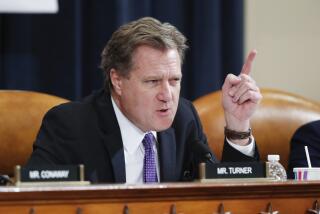Reagan Ties Policy on Soviet to Spying : Links Better Relations to Espionage Halt; Shultz to Focus on Embassy Issue
- Share via
President Reagan, escalating the espionage dispute with the Soviet Union, declared Saturday that the United States’ relations with Moscow cannot improve unless such activities are ended.
Capping a week of charges and countercharges that have stemmed from the discovery that the Soviet Union gained access to some of the most secure facilities in the U.S. Embassy in Moscow, Reagan charged that “the Soviets have gone beyond the bounds of reason.”
The President’s remarks were part of his weekly radio address, which he broadcast from Los Angeles before flying to his Santa Barbara ranch.
‘Major Agenda Item’
Reagan also said that he had instructed Secretary of State George P. Shultz “to make embassy security a major agenda item” during his meetings this week in Moscow with Soviet Foreign Minister Eduard A. Shevardnadze. Shultz left Washington on Saturday.
As a result of the espionage revelations, Reagan said, “this meeting will be much weightier than expected.” Originally, Shultz was scheduled to review arms control issues in general and, in particular, to seek from the Soviets a response to U.S. proposals to limit medium-range nuclear weapons in Europe.
Reagan’s comments followed a report in The Times Saturday that he and other senior Administration officials were given a critique of security at the embassy in Moscow by a top FBI counterintelligence expert, who had secretly conducted a thorough sweep of the diplomatic outpost in 1983.
U.S. sources reporting on the review said the FBI expert, who presented a lecture and slide show, said security was so lax that agents of the KGB, the Soviet secret police, could have penetrated the embassy’s three “secure” floors even then, eluding guards and alarm systems.
White House officials refused to comment on The Times’ report.
The stories of Soviet spying have emerged in recent weeks after the arrests of two Marines, Sgt. Clayton J. Lonetree and Cpl. Arnold Bracy, who served as sentries at the embassy. They are alleged to have permitted Soviet agents access to the embassy’s communications facilities.
A third Marine, Sgt. John Joseph Weirick, reportedly will be charged with aiding Soviet espionage efforts against the American Consulate in Leningrad, while a fourth, Staff Sgt. Robert S. Stufflebeam, has been charged with improperly associating with Soviet women while he helped supervise the Marine contingent in Moscow.
Six Executions Reported
Government sources have told The Times that at least six Soviet citizens working secretly for U.S. intelligence agencies within the Soviet Union have been arrested and executed since late 1985, apparently because of the security compromises at the embassy.
In addition, the Soviets have charged that the United States has bugged the new embassy they are constructing in Washington, and Reagan has said that similar bugging at a new U.S. embassy under construction in Moscow may force the United States to tear down the facility and rebuild it in a more secure fashion.
“Unfortunately, no one is suggesting that Soviet espionage is not a fact of life,” Reagan said. “But what seems to be emerging is the picture of an intense espionage strategy that reflects a callous disregard for the consequences of such actions.”
The President said that sensors and listening devices have been found in the material being used to construct the new embassy in Moscow. On Tuesday, he announced that American diplomats there would not be allowed to move into the building until he is assured of its security. He also said that Soviets in Washington could not move into their new building until the American move takes place.
Points to 1969 Accord
Referring to an effort, nearly two decades old, to allow the two nations to develop new diplomatic posts in each other’s capitals on a parallel course, Reagan said:
“What the Soviets have done is throw off track a bilateral process that has been moving forward since 1969, when an agreement was made, after long negotiations, about new embassy sites.
“We do not take this lightly,” he declared. “Secretary Shultz will make certain the Soviets understand that if we’re to improve relations, such espionage tactics are totally unacceptable.”
In his sharp criticism of the Soviet Union, Reagan took an even harsher approach than he followed on Friday, when he said in a speech to the Los Angeles World Affairs Council that “there’s no excuse” for the Soviet bugging activity. His remarks to the Los Angeles group, however, were tempered with a view that there was “no cause for alarm” in his assessment of U.S.-Soviet relations and that the dispute would not sour the superpowers’ arms control efforts.
The President opened his five-minute speech Saturday by noting that “there’s reason for optimism about the chances for better relations with the Soviets,” but he went on to say that the United States faces “some tough, contentious issues that require realism and strength of will on our part.”
Outrage Grows
While the President has been traveling--he left Washington on Thursday--outrage over the affair has grown in the capital, with senators demanding to know why stronger action had not been taken to give the embassy greater protection.
At midday Saturday, the President and Mrs. Reagan lunched with about 100 guests at the Bel-Air home of real estate developer Harry Singleton, who is leading the effort to construct Reagan’s presidential library at Stanford University. Later, the President and First Lady flew by helicopter to their ranch 30 miles west of Santa Barbara, where they are spending a weeklong Easter holiday.
It is their first visit to the ranch since Thanksgiving.
More to Read
Sign up for Essential California
The most important California stories and recommendations in your inbox every morning.
You may occasionally receive promotional content from the Los Angeles Times.













